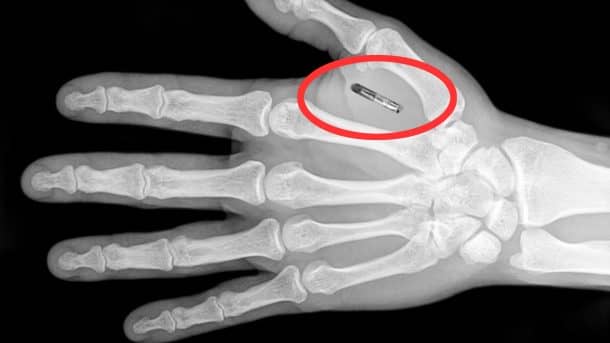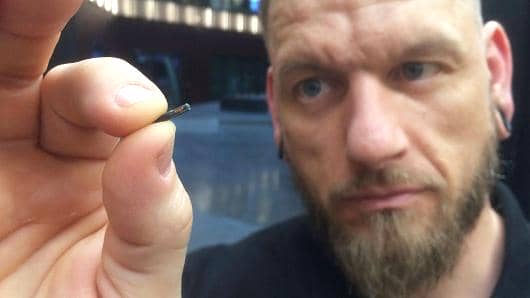Would you like to turn into a human cyborg? If yes, then this Swedish startup called Epicenter is the place to be! The startup has been offering their employees the option of having a small microchip implanted in their hand for over two years, and already 150 of its 3,000 workers have opted for the crazy attachment!
The implanted microchips have the size of a grain of rice and have also been used on the collar plates of pets and tracking devices for deliveries. But epicenter implants them into their employees’ hands, which is the first time they have been used to tag a human being.

The 150 workers at epicenter are very happy with their decision and claim that the implant has made their lives a whole lot easier. None of them has to keep an access card to open doors, operate company printers or order lunch. They can do it all by a magical wave of the hand with the implanted chip, and voila!
“The biggest benefit I think is convenience,” Epicenter co-founder and CEO, Patrick Mesterton, told the Associated Press. “It basically replaces a lot of things you have, other communication devices, whether it be credit cards or keys.”

The company offers the implant for free and celebrates whenever an employee decides to take up the opportunity with an office party. The implantation procedure is quick and relatively painless, which is injected into the flesh right next to the thumb. The procedure feels like a quick injection, and there is no blood involved.
“We already interact with technology all the time,” Epicenter employee Hannes Sjoblad told the BBC, in 2015. Today it’s a bit messy – we need pin codes and passwords. Wouldn’t it be easy to just touch with your hand? That’s really intuitive.”
“We want to be able to understand this technology before big corporates and big government come to us and say everyone should get chipped – the tax authority chip, the Google or Facebook chip,” Hannes added.

But not everyone is comfortable with having a 24/7 tracker in their bodies. Ben Libberton, a microbiologist at Stockholm’s Karolinska Institute, thinks the decision on implantation depends on how advanced the microchips can get.
“The data that you could possibly get from a chip that is embedded in your body is a lot different from the data that you can get from a smartphone,” he told AP. “Conceptually you could get data about your health, you could get data about your whereabouts, how often you’re working, how long you’re working, if you’re taking toilet breaks and things like that.”
The chips use Near Field Communication (NFC) technology, which is the same as used in many contactless cards. The chips are passive, which means they can be read by multiple devices while they can’t read any information themselves.
Watch the BBC video below on how the microchip is implanted.


